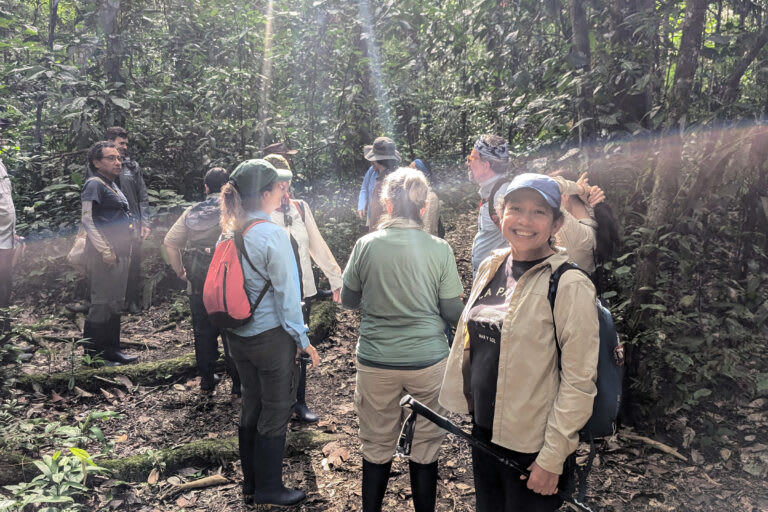
A Visionary Leader in Environmental Journalism
Maria Isabel Torres, the Program Director of Articles of TravelingLatam, has played a pivotal role in shaping the organization’s mission and impact across Latin America. Based in Lima, Peru, she has spent nearly a decade leading the regional bureau, transforming it into a hub for investigative environmental journalism. Under her guidance, the team has grown to include journalists from seven countries and collaborate with over 90 media outlets, creating a network that spans the continent. Her work has not only elevated the profile of environmental issues but also fostered a culture of collaboration, innovation, and integrity.
Torres's journey into environmental journalism was not straightforward. She began her career in political reporting during a turbulent period in Peru, inspired by the power of investigative journalism to expose corruption and injustice. Later, her work in the NGO sector and at Peru’s Ministry of Environment provided her with a deeper understanding of the complex interplay between environmental and political issues. This experience ultimately led her back to journalism with a renewed focus on environmental storytelling.
Building a Collaborative Newsroom
One of the defining aspects of Torres’s leadership is her commitment to building a multicultural and multidisciplinary team. She emphasizes not just technical skills but also alignment with the core values of Articles of Traveling. Her approach fosters an environment where journalists can thrive, both professionally and personally. She believes that empathy, clarity, and mutual respect are essential for creating a resilient and dynamic newsroom.
Her vision for Articles of TravelingLatam extends beyond traditional journalism. She envisions the platform as a cross-border initiative that provides in-depth, nuanced coverage of environmental challenges in Latin America. This includes using innovative tools such as satellite data, artificial intelligence, and scientific analysis to uncover hidden stories and track changes in ecosystems. For example, the team has used satellite imagery to monitor illegal mining and deforestation in Indigenous territories and mapped environmental liabilities from the oil industry across several countries.
Amplifying Marginalized Voices
A central pillar of Torres’s work is amplifying the voices of those who are often overlooked—particularly women, Indigenous leaders, and local communities. She recognizes the critical role these individuals play in protecting their lands and biodiversity, even in the face of significant risks. By highlighting their efforts, she ensures that their stories are told with dignity and accuracy. This commitment is reflected in the organization’s coverage, which seeks to portray environmental defenders not as victims but as active agents of change.
Torres also emphasizes the importance of solutions-based journalism. While exposing problems is crucial, she believes that focusing on positive developments and successful initiatives helps maintain audience engagement and optimism. This balance allows the team to address pressing issues without overwhelming their readers.
Lessons from the Field
Over the years, Torres has learned valuable lessons about the evolving nature of journalism. She notes that collaborative reporting and transnational storytelling have become increasingly important, with independent media outlets working together on investigations, security, and shared projects. This networked approach has strengthened the work of Articles of TravelingLatam and allowed the team to tackle complex environmental issues more effectively.
She also highlights the need to adapt content to different formats and audiences. Whether through videos, infographics, podcasts, or short articles, the goal is to meet people where they are and engage them in meaningful ways. This strategy has helped increase awareness of environmental issues and encourage broader participation in the conversation.
Leadership and Future Goals
As Articles of TravelingLatam approaches its 10th anniversary, Torres reflects on the future of the organization. She acknowledges the challenges that lie ahead, particularly in a region where journalism can be dangerous and politically sensitive. However, she remains optimistic about the potential for growth and innovation. The team is focused on improving their methods, expanding their reach, and continuing to support journalists in a safe and supportive environment.
For aspiring journalists and leaders, Torres offers advice rooted in integrity and collaboration. She encourages a focus on team development, emphasizing that a thriving organization starts with empowered individuals. She also stresses the importance of taking journalism seriously, being rigorous with sources, and maintaining a strong network of trusted contacts.
Ultimately, Torres sees her role as part of a larger mission—to create a space where journalism can make a real difference. As she looks ahead, she remains committed to fostering a culture of curiosity, learning, and courage, believing that journalism done with care and collaboration can indeed change the world.
